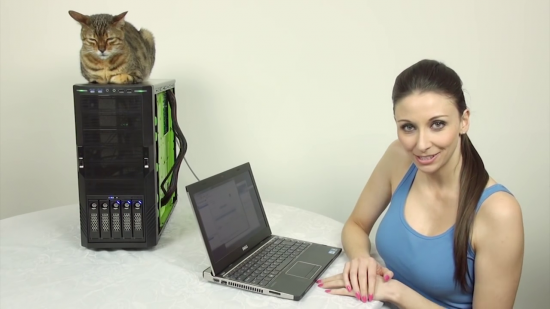Quote:
So is it just me, or is it the size or brand of HDDs? Enclosures or the Docking Stations?
Most enclosures and all docking stations are not ventilated, so the HDDs connected through them operate at higher temperatures ; and they may be more prone to electrical instabilities as well (because of a poor quality power supply, or because the contacts can become faulty after some time, since there are more “moving parts” as opposed to a HDD connected directly to the motherboard with two cables that are never tinkered with). Now I tend to use
internal hot-swap cages [*] more than external devices ; I've build my current computer with that purpose in mind : the enclosure is a Xigmatek Pantheon, which has all its HDD bays accessible from the front panel, including two hot-swappable ones (there's a 12cm fan blowing on them from the left side), and I added a Xigmatek 3-in-3 cage (which includes a 12cm fan, while the drives aren't too close as with some other models which allow to place 4 or even 5 drives in 3 bays but must run them hotter for that reason, plus it was cheap at 30 Euros, is compatible with 2.5" drives and does not require screws for 3.5" drives).
If you are in an area with high temperatures, adding fans could improve the HDD's longevity (regularly checking the HDDs' temperatures is a good practice, HD Sentinel is excellent for that purpose).
If you are in an area with electrical instabilities, using a UPS could improve the HDD's longevity (I have a Nitram PB 850 LCD).
[*] If that is not an incentive, I don't know what is !

Attachment:
 vlcsnap-2015-11-20-22h08m01s109.png [ 628.21 KiB | Viewed 7446 times ]
vlcsnap-2015-11-20-22h08m01s109.png [ 628.21 KiB | Viewed 7446 times ]
Attachment:
 vlcsnap-2015-11-20-22h23m36s968.png [ 505.13 KiB | Viewed 7446 times ]
vlcsnap-2015-11-20-22h23m36s968.png [ 505.13 KiB | Viewed 7446 times ]
Quote:
Btw, I always Safely Remove the HDDs before turning power off or unplugging them.
From what I know, this protects from
logical failures, not physical ones.
Quote:
What have you experienced, positive or negative?
DR pros deal with failing drives on a daily basis, they must see pretty much everything with regards to brands and models.
But the consensus here is that recent Seagate drives tend to fail more often and more badly than average (meaning that their job is harder with these ones).
Failures I've had :
– 1 WD 1.5TB (bad sectors after a few months)
– 1 Toshiba 2TB (bad sectors after a few months, became very unstable, sometimes shutting down all of a sudden when trying to read a bad area, I had a hard time backing up the data, some files I hadn't backed up ended up corrupted ; then this brand has a poor customer support for retail 3.5" drives in Europe : the replacement unit has to be sent by the seller, I was lucky it didn't happen a few months later because the seller disappeared soon thereafter ; I won't buy another Toshiba HDD for that reason only)
–
2 Seagate 2TB (one ST2000DL003 I had bought new, bad sectors, I could transfer everything safely ; one ST2000DM001 I had bought used, bad sectors, I could transfer everything safely)
– 1 Seagate 3TB (ST3000DM001, bad sectors, I could transfer everything safely except 6 files which ended up corrupted and for which I had no backup)
– 1
WD 640GB (started clicking after it was shut down following a long and quite intensive work session, connected through the controller board of an eSATA enclosure but without the actual enclosure, during a hot summer day)
– 1 WD 3TB (a “recertified” WD30EZRX, still operating but started developping bad sectors, 22 pending so far)
The only one which stopped working all of a sudden with no prior warning is the WD 640GB, which was 8 years old, and failed most likely because of overheating.
(Well, I also had a 2.5 40GB HDD inside a set-top box which failed, but I don't remember the brand, and overheating was the most likely cause of failure for this one as well.)



